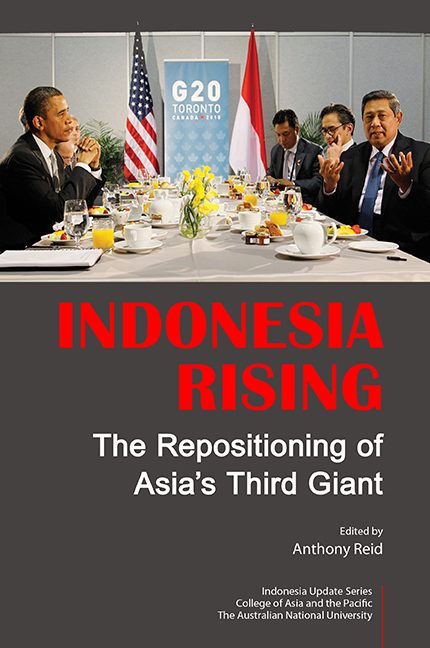Book contents
- Frontmatter
- Contents
- Tables
- Figures
- Contributors
- Foreword by Gareth Evans
- Preface
- Glossary
- 1 Indonesia's New Prominence in the World
- 2 Indonesia in the New World Balance
- 3 Indonesia's Role in the World Economy: Sitting on the Fence
- 4 Is Indonesia Rising? It Depends
- 5 Domestic Politics and International Posture: Constraints and Possibilities
- 6 Can Indonesia Lead on Climate Change?
- 7 Indonesian Muslims and Their Place in the Larger World of Islam
- 8 Indonesia's Quiet Springtime: Knowledge, Policy and Reform
- 9 Problems of Identity and Legitimacy for Indonesia's Place in the World
- Index
- INDONESIA UPDATE SERIES
2 - Indonesia in the New World Balance
Published online by Cambridge University Press: 21 October 2015
- Frontmatter
- Contents
- Tables
- Figures
- Contributors
- Foreword by Gareth Evans
- Preface
- Glossary
- 1 Indonesia's New Prominence in the World
- 2 Indonesia in the New World Balance
- 3 Indonesia's Role in the World Economy: Sitting on the Fence
- 4 Is Indonesia Rising? It Depends
- 5 Domestic Politics and International Posture: Constraints and Possibilities
- 6 Can Indonesia Lead on Climate Change?
- 7 Indonesian Muslims and Their Place in the Larger World of Islam
- 8 Indonesia's Quiet Springtime: Knowledge, Policy and Reform
- 9 Problems of Identity and Legitimacy for Indonesia's Place in the World
- Index
- INDONESIA UPDATE SERIES
Summary
The final quarter of the twentieth century saw modern economic growth firmly established in the populous countries of Asia for the first time: China from the late 1970s, Indonesia from the mid-1980s, India from the early 1990s and other Southeast Asian economies at various times over the period. The acceleration in growth in the large Asian countries was associated with an inexorable shift in the centre of gravity of global economic activity and power.
This shift was briefly disturbed and temporarily obscured by the Asian financial crisis in 1997–98. The crisis had its most severe and profound consequences in Indonesia, where it led into the trauma of democratization, and then the painful reconciliation of the pressures from a democratic polity and modern economic growth. But reconciled they were, and the late twentieth-century tendencies and expectations for continued economic growth were re-established in the first decade of the twenty-first century.
In the first seven years of the new century, the world was moving gradually and slowly out of the brief unipolar moment in which the United States appeared to dominate international affairs, towards a new, multipolar balance. The end point was likely to be a balance within which four entities were much more important than others: the United States, China, the European Union and India. In the emerging multipolar world, no consequential international action would be possible if any one of the four great centres of power was deeply uncomfortable with it. The European Union would sometimes be influential through some of its constituent national parts, but increasingly, and eventually mainly, through integrated action.
In a multipolar world, the role of the next tier of substantial economies would be more influential than in the unipolar system of the late twentieth century, or the bipolar system with the Soviet Union that preceded it. Interaction of the four great powers with other considerable countries would be important in shaping what was possible in international cooperation.
The shift to a multipolar world in the late twentieth and early twentyfirst centuries was inexorable, but slow and gradual. The unipolar dominance of the United States after the collapse of the Soviet Union seemed likely to fade gradually and slowly, leaving plenty of time for the international community to learn how to make cooperative relations among states work within new power realities.
- Type
- Chapter
- Information
- Indonesia RisingThe Repositioning of Asia's Third Giant, pp. 14 - 27Publisher: ISEAS–Yusof Ishak InstitutePrint publication year: 2012

